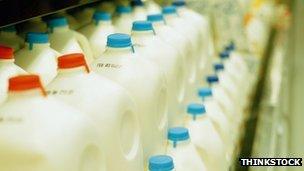Should politicians know the price of a pint of milk?
- Published

A Tory MP has described David Cameron and George Osborne as "two posh boys who don't know the price of milk". But why is knowing the price of milk so important?
It's a classical political ambush that has been popular on both sides of the Atlantic for decades.
Politicians, constantly primed to deal with detailed questions on policy, personnel or principles, are instead asked the price of something.
But it's not the price of the new fighter jet or flagship hospital - instead it's a stamp, a loaf of bread or, most of all, a pint of milk.
In 1992, US President George H W Bush, was forced to admit he did not know how much a gallon of milk cost during a debate with Bill Clinton and Ross Perot.
Another American to suffer a similar reality check was Rudy Giuliani, the former mayor of New York City <link> <caption>who was rumbled while on the campaign trail in Alabama</caption> <url href="http://www.outsidethebeltway.com/giuliani_clueless_on_milk_and_bread_prices/" platform="highweb"/> </link> . He managed to underestimate the cost by about 50%.
But why should the price of milk be a classic measure of being in touch with reality?
There is a suspicion among many cynical voters that their leaders live in a world divorced from ordinary life.
The man on the Clapham omnibus imagines a world staffed by nannies, chefs, bodyguards, and even people who do that most mundane of ordinary person tasks - going shopping.
It's an image no politician wants. They try to legislate about and govern ordinary people's lives, and it therefore follows that voters want them to be in touch with those lives.
Matthew Parris, Times columnist and former Conservative MP, says ambush questions are a "very successful and effective way" of making politicians look out of touch.
"Nick Clegg got in trouble for not knowing the basic state pension a couple of years ago.
"And just after Dick Caborn was made sports minister about 10 years ago <link> <caption>someone asked him lots of questions about sports and sports teams</caption> <url href="http://www.thisislondon.co.uk/sport/my-quiz-felled-desperate-minister-6338079.html" platform="highweb"/> </link> and he couldn't answer any of them. He probably shouldn't have agreed to answer them," he says.
Parris says canny politicians know that questions like the price of products can be thrown at them to catch them off guard and swot up accordingly.
"Most people don't know most things most of the time. I think most men probably don't know the price of milk. People mainly only remember things like this if they are struggling with money - and politicians are not.
"But politicians don't want to look foolish - and it sounds foolish if they don't know things," he says.
Politicians are so concerned about appearing to be in touch that they often have sessions to bring them up to speed on lifestyle and popular culture, according to Conservative Home's Tim Montgomerie.
"Blair had a weekly video of cultural highlights prepared for him by advisers. It would contain things like who was on the X Factor, what Dot Cotton was saying on EastEnders.
"That takes it too far, but I don't think it's unreasonable for people to expect politicians to understand the pressures ordinary families face, especially when the cost of living is squeezed and everybody's ability to afford basic provisions cannot be taken for granted," he says.
Montgomerie cites Margaret Thatcher as a politician who was able to convince people she understood that she was in touch with hard-pressed families in the 1970s.
"She used to wield a shopping basket and talk about the price of the pound and say something needed to be done about it.
"When you have PMs who have spent tens of thousands of pounds on kitting out a new kitchen in Downing Street, then there is a risk you are feeding a perception that you aren't in touch with public opinion," he says.
But why milk and not a unit of electricity, or 80 tea bags, or a 40W bulb?
Anthony King, professor of British government at the University of Essex, says he understands why milk is a "shorthand - or a way of expressing succinctly that a politician may be out of touch".
But he argues there are numerous reasons why it would be perfectly feasible for politicians not to know the price of it.
"It could be down to division of labour within a household, or people not paying attention to the price because they know they can afford it.
"I don't know the price of milk, but all that tells me is my income is large enough not to worry about it, whereas I do know the price of petrol," he says.
Throw in the fact that milk comes in various quantities, and increasingly numerous guises - from whole, skimmed, semi-skimmed and soya to coconut, rice, goat and even camel - and it's easy to see how politicians could argue milk is no longer a fair indicator.
David Cameron: "I pay just under 50p for milk'"
But Parris thinks there is something about milk that makes it particularly powerful.
"Mrs Thatcher got into lots of trouble for taking away milk - so there is something about milk, it's bound up with motherhood," he says.
For Prof John Curtice, professor of politics at the University of Strathclyde, milk is often cited simply because it is one of our staple foods.
"If someone was stuck in the middle of nowhere with no food, and he or she suddenly saw a shop, milk and bread would probably be the two things he or she would buy.
"They are our standard liquid and solid foods. They are the basic staples it is presumed that virtually everyone buys, unless they have their own cow, or make their own bread," he says.
On that analysis politicians - and celebrities wishing to appear down-to-earth - can get away with revising just two prices. Easy.